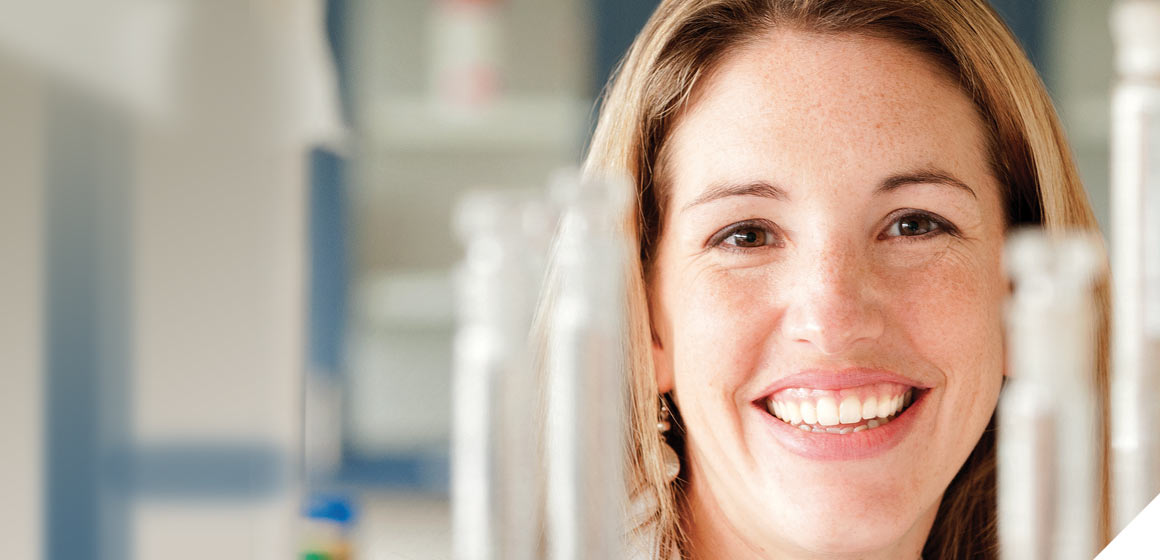 Monday 3 February 2014 11:00am
Monday 3 February 2014 11:00amNanoparticles may be very small, but they are also immensely powerful as the basis of new tools for a wide range of uses – from improving current technology to inventing new ways of doing things.
Dr Carla Meledandri (Chemistry) is at the forefront of exploring the nano world, working on fine-tuning and exploiting the properties of its materials for innovative practical applications.
"Our interests encompass both fundamental and applied aspects of nanomaterials research," says Meledandri, who recently won an Early Career Award for Distinction in Research.
"Current projects are interdisciplinary, combining chemistry, materials science, physics and biological sciences in order to develop new materials with potential application in biomedicine and for use as nanoswitches."
Medicine and dentistry stand to gain from some of the early discoveries.
"We aim to perform academic research in the area of nanoscale materials and couple our findings, where appropriate, to practical applications, particularly in the area of nanomedicine, for improved medical diagnosis and targeted therapy."
Synthesising nanoparticles of a specific size and/or shape is seen as one way of controlling their properties to get them to do what you need done.
Optimising the size and shape of magnetic nanoparticles in suspension, for example, is crucial for controlling their magnetic behaviour, which is being explored to create better materials to use with magnetic resonance imaging (MRI) scans.
Shape-controlled magnetic nanoparticle suspensions should enhance the image contrast between healthy and diseased tissues in MRI images, hopefully improving the application of MRI for more accurate diagnoses.
"Nanoparticles of different shapes have different facets, thus, a different fraction of atoms located at the surface. As the magnetic properties at the surface of nanoparticles differ from those in the interior, we expect that a change in shape will significantly affect the magnetic behaviour of the nanoparticle suspensions.
"We aim to perform academic research in the area of nanoscale materials and couple our findings, where appropriate, to practical applications, particularly in the area of nanomedicine, for improved medical diagnosis and targeted therapy."
Dental therapy is another area where nanoscale materials could soon be revolutionising treatment.
Meledandri is collaborating with Dentistry's Dr Don Schwass to design and fabricate antibacterial silver nanoparticle-based materials for use in clinical practice.
The idea, which won the pair an Otago Innovation Proof of Concept Award, should provide a way to deliver and maintain antibacterial effects deep within the tooth for treating and preventing tooth decay.
"We have developed a targeting strategy that has resulted in the enhanced penetration of our silver nanocomposite structures into dentine tubules to target the bacterial source of the disease."
Tests have shown that the nanoparticle suspensions have potent antibacterial qualities at low concentrations, as well as appearing pale yellow or colourless, so not discolouring teeth.
"There is a significant commercial opportunity for our proposed materials combined with their delivery method and the intended outcome of our project is a novel product, suitable for use in clinical dentistry."
The researchers are currently working with the University's Otago Innovation Limited to see how best to apply their work.
Other research includes investigating different approaches to synthesising metal and metal oxide nanoparticles. Meledandri's team is breaking new ground to get better control over the process and fine-tune nanoparticles for subsequent specific uses, including applications in devices.
"Our research is directed toward the design, synthesis and characterisation of functional nanoscale materials.
"The interest in nanoscale materials lies in the fact that their size, shape and composition can dramatically affect their physical and chemical properties. This phenomenon can be exploited to develop new materials with tuneable properties for a broad range of applications."
2013 Early Career Awards for Distinction in Research
2013 Early Career Awards for Distinction in Research were also presented to Dr Karen Brounéus (National Centre for Peace and Conflict Studies), Dr Lyndie Foster Page (Faculty of Dentistry), Dr Suetonia Palmer (Medicine, Christchurch) and Dr Virginia Toy (Geology). Dr Shinichi Nakagawa (Zoology) received the Carl Smith Medal and Rowheath Trust Award, recognising his outstanding research performance as an early-career staff member.
Dr Nakagawa's research spans the diverse areas of behavioural and evolutionary ecology, evolutionary genetics and endocrinology, behavioural neuroscience, nutritional ecology and statistical computational biology.
Dr Brounéus' research focuses on psychological aspects of peace-building. She is conducting a study in the Solomon Islands on the effect of the Truth and Reconciliation Commission process on people's attitudes towards co-existence and peace. She is also involved in two collaborative projects on peace-building in Ethiopia and Thailand.
Dr Foster Page is investigating a wide range of oral conditions, problems and settings, notably in the areas of dental caries and young people's oral health. Much of her work is concerned with children's quality of life. She is currently focusing on novel approaches to managing caries in children.
Dr Palmer's research translates new discoveries in kidney disease into useable information for patients, clinicians and policy-makers. She has an active international programme of research with collaborators in Australia, Europe and Canada.
A structural geologist, Dr Toy's research combines field studies of deformed rocks from Earth's crust and mantle lithosphere, with detailed microscopic and textural analysis. She is extensively involved in scientific drilling into active structures such as New Zealand's Alpine Fault and co-ordinates the Deep Fault Drilling Project.
Funding
- Marsden Fast-Start Grant
- Otago Innovation Proof of Concept Award